

Audio Preservation — NEDCC. In 2013, the Northeast Document Conservation Center was awarded a $250,000 National Leadership Grant from the Institute of Museum and Library Services to develop, test, and demonstrate a new digital reformatting service for early audio recordings on grooved media using IRENE, a system developed by the Lawrence Berkeley National Laboratory and successfully tested at the Library of Congress.
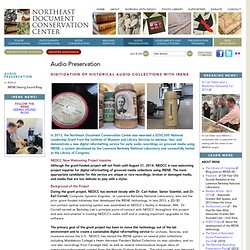
68 essential resources for eBooks in libraries by Ellyssa Kroski. Ellyssa Kroski, Director of Information Technology at the New York Law Institute and the blogger for OEDb’s iLibrarian, as well as a writer, educator, and international conference speaker, developed this list of 68 essential resources about eBooks in libraries.
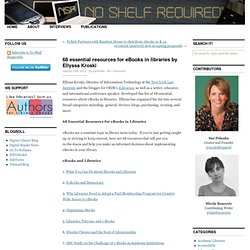
Ellyssa has organized the list into several broad categories including: general, devices, blogs, purchasing, creating, and more. 68 Essential Resources for eBooks in Libraries. 42 Library Stories You May Have Missed in June. Library Preservation and Conservation Tutorial: Iraq and the Middle East. Housekeeping Good housekeeping for library and archive collections means keeping the materials and surrounding areas clean, educating staff and users in how to handle research materials, monitoring handling practices, and how users conduct themselves on library premises (and monitoring them), and housing and shelving materials appropriately.
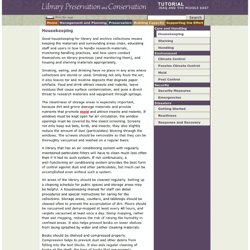
HLWIKI Canada. Are you interested in contributing to HLWIKI International?
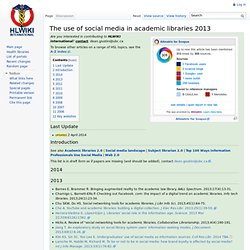
Contact: dean.giustini@ubc.ca To browse other articles on a range of HSL topics, see the A-Z index. Last Update 2 April 2014 Introduction. HLWIKI Canada. This online course is for MLIS students continent-wide in 2014 Are you interested in contributing to HLWIKI International?
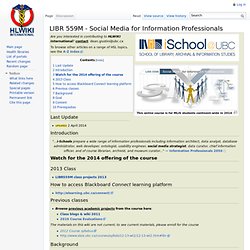
Contact: dean.giustini@ubc.ca To browse other articles on a range of HSL topics, see the A-Z index. Last Update 2 April 2014 Introduction. Internet Archive. The Mobile Challenge. A good example of responsive web design from the Canton Public Library, MI Right now, the biggest trend in website design is responsive web design (RWD).
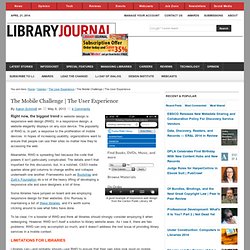
In a responsive design, a website elegantly displays on any size device. The popularity of RWD is, in part, a response to the proliferation of mobile devices. In hopes of increasing usability, organizations want to ensure that people can use their sites no matter how they’re accessing the web. Facet eBooks. Librarian by Day. FutureBook. UK Web Archive. Preservation 101. As Libraries Go Digital, Sharing of Data Conflicts With Tradition of Privacy - Technology. By Marc Parry Cambridge, Mass.
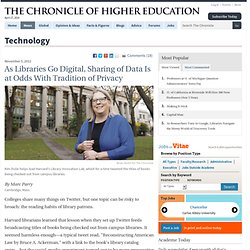
Colleges share many things on Twitter, but one topic can be risky to broach: the reading habits of library patrons. Harvard librarians learned that lesson when they set up Twitter feeds broadcasting titles of books being checked out from campus libraries. College & Research Libraries. Preservation & Conservation (non-digital) IPI Sustainability. Did you attend a workshop and would like follow-up information?
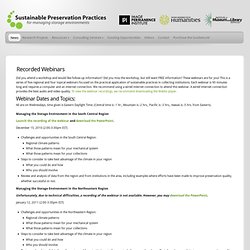
Did you miss the workshop, but still want FREE information? These webinars are for you! This is a series of five regional and four topical webinars focused on the practical application of sustainable practices in collecting institutions. Each webinar is 90 minutes long and requires a computer and an internet connection. We recommend using a wired internet connection to attend this webinar. Webinar Dates and Topics: 4 Analytics Tools Librarians Should Know About. Analytics tools are an invaluable way to show the ROI of marketing campaigns, popularity and usability of website content, value of blog posts, social media influence, and much more.
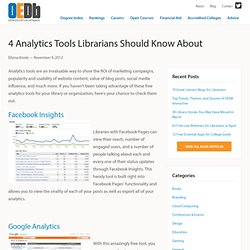
If you haven’t been taking advantage of these free analytics tools for your library or organization, here’s your chance to check them out. Facebook Insights Libraries with Facebook Pages can view their reach, number of engaged users, and a number of people talking about each and every one of their status updates through Facebook Insights. This handy tool is built right into Facebook Pages’ functionality and allows you to view the virality of each of your posts as well as export all of your analytics. Google Analytics With this amazingly free tool, you can access robust reports indicating the total number of visitors to your website, their demographic, browser, and engagement information. Ten Things I Didn't Learn in Library School, Academic Edition. Eric Riley wrote a similar post about public libraries that you should also read, since plenty of academic libraries (especially large, urban ones) have the same issues.
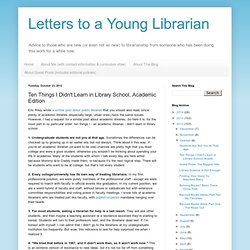
Free Software for Libraries Ideas Exchange. I’ve posted quite a bit in the past about different free software products I’ve used in my library such as in the articles below, but I’d love to hear what everyone else is using. Let’s have an ideas exchange about what free software products you’ve been able to make use of in your library or organization. Please submit an entry to the poll below!! Managing Electronic Resources “I came across a free open-source Electronic Resources Management System called Coral that’s been developed by the folks at the University of Notre Dame’s Hesburgh Libraries. I’m so impressed with it I wanted to share the details with everyone. Managing Electronic Resources. One of the responsibilities that came with my new position here at the New York Law Institute is the management of our electronic resources.
Although at first it didn’t seem like we had a significant number, once we started compiling a list we realized that we did have quite a few. I wanted a way to keep track of all of the dates that the license agreements were up for renewal, what we’re paying for each, who our main contacts are at each provider, etc. My first thought was to check to see if we had an ERM (electronic resource management) module in our ILS (integrated library system) that would have the functionality I wanted.
It turned out that while we do have an ERM module available, it lacks the ability to automatically send out email alerts to myself and other stakeholders when an electronic resource is nearing the expiration of the license. This was a major criteria of mine so I kept looking for something beyond what I could achieve simply through an Excel spreadsheet. This is Why We Can’t Have Nice Things: Reclaim Your Inbox. In Brief: In this article, co-authors Lindsay Sarin and Erin Dorney experiment with managing email (testing three existing systems), explore the idea of managing communication expectations, and consider the implications these strategies could have on our library communities.
Email Everywhere Email celebrated its 41st birthday this year. Originally a technology reserved for the savviest of computer geeks, email first moved into the academic and corporate worlds, then into our homes, and today into our pockets. A 2011 report from the Pew Internet and American Life Projectfound that 92% of adults in the United States use email, with 49% of those surveyed checking their email on a daily basis (p. 2).
The Radicati Group, a market research firm focused on the computer and telecommunications industry, reports that in 2011, “…the typical corporate email user sends and receives about 105 email messages per day” (p. 3). Court rules book scanning is fair use, suggesting Google Books victory. The Author's Guild has suffered another major setback in its fight to stop Google's ambitious book-scanning project. OCLC WorldCat Linked Data Release – Significant In Many Ways. Libraries design. 20 Cutting-Edge Library Services For Those With Special Needs. The Book That Can't Wait - Eterna Cadencia. Birth of a Book. Nimble - Augmented Reality book-based library. IFLA 2012 - Knowledge Management Section - Abstracts and full papers.
“That’s how we do things around here”: Organizational culture (and change) in libraries. The relationship between archives and knowledge management: some evidence from Australia.